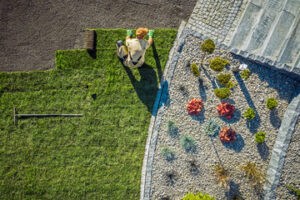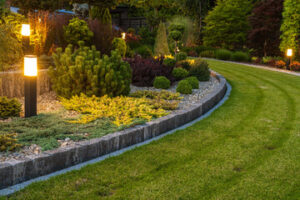Mulch Harrisburg PA retains soil moisture, suppresses weeds, and improves the look of garden beds and landscaped areas. Organic mulches also add organic matter to the soil over time.
Mowing, trimming, and weeding near trees and shrubs can damage roots and trunks. Mulching with a light, fluffy material like pine needles can help.

Weeds are a major garden nuisance that steal moisture, nutrients, and sunlight from the plants you want to grow. They also tend to be resistant to most weed killers. Mulching your garden with the right kind of mulch can make it almost impossible for weeds to get established.
Many types of mulch will suppress weeds, but the most effective are organic materials that improve soil and do not have chemical additives. This means things like leaves, straw, compost, grass clippings, shredded bark and even newspaper. The key is that the material must not allow any sunlight to penetrate to the soil surface, which is where weed seeds germinate.
Organic mulches can be laid down thickly around all kinds of landscape and garden plants, and they are usually reapplied annually. Inorganic mulches like gravel or river rock, on the other hand, require less frequent reapplication and are more appropriate around hardscape elements such as gardens, paths and driveways.
Some inorganic mulches also work to suppress weed growth. For example, Preen Mulch with Weed Preventer is an easy-to-use ground cover that helps prevent weeds for six months with a single application and does not require any annual reapplication. It is available at Lowe’s and requires only a 2-inch layer to prevent weeds, which is significantly less than other mulches that need a 3-inch depth.
The most important thing is to choose a mulch material that works well with your particular plant and garden beds. Some materials may decompose too quickly, while others are too dense or have a bad smell that can be toxic to plants. For example, high carbon wood chips (like those made from sawdust) may tie up nitrogen in the soil and are more susceptible to fungus than other options, but they are cheap and work well for pathways or under larger shrubs and trees. Some commercially produced mulches have been blended with chemical weed-preventers, but these can contain ingredients that are undesirable for vegetable gardens and children’s play areas. They may also be more prone to mold and may require more maintenance.
Water Retention
Mulch acts like a guardian of moisture, trapping it within the soil and minimizing evaporation. It also helps prevent water runoff, especially in the sandy soils common across Florida. This conserves moisture for the roots of your plants, encouraging plant health and resilience in drought conditions.
The type of mulch you choose and how thick it is will affect its effectiveness. Finer mulches such as shredded leaves or compost are better for vegetable gardens and annuals, while coarser mulches like straw or bark chips are ideal for shrubs and perennials. It’s important to keep in mind that your mulch will need to be refreshed periodically.
To be effective, mulch should be applied at a depth of 2 to 4 inches. This creates a barrier that will prevent weed growth and soil compaction while protecting the plants underneath. It’s also helpful to leave a gap around the base of each plant to avoid stem rot and other problems associated with direct contact with mulch.
Temperature Control
Mulch insulating the soil helps stabilize its temperature, keeping it warmer in winter and cooler in summer. This improves root health by preventing the roots from having to experience repeated cycles of freezing and thawing, which can be very stressful for them.
In addition to regulating the soil’s temperature, mulch can help improve its texture and improve nutrient levels (if organic). As they break down, organic mulches enrich the soil with valuable nutrients, allowing it to become more hospitable to plant growth.
The water-holding capacity of different mulch materials can be compared using the following equation:
Temperature Control
Mulch acts as a natural insulator, keeping soil cooler during the summer and warmer in the winter. This temperature regulation can help reduce stress on plant roots and promote steady growth.
The insulating properties of mulch also help prevent moisture loss. Instead of evaporating from the surface of the soil, water is retained in the soil longer so it can be absorbed by plants more effectively. This can save gardeners time and money as they don’t need to water their plants as frequently.
Aesthetics
Mulching can also add a finished look to garden beds and other landscaped areas. Gardeners can choose from a variety of colors and textures to complement their garden design. Whether they prefer the earthy tones of wood chips or the uniformity of stone, there is a mulch to suit their taste and garden style.
In comparison to bare soil, soil under plastic mulches tends to have lower temperatures due to their ability to block direct solar irradiation and minimize heat transfer from the soil to the mulch surface. However, this benefit can be offset by the fact that the higher temperatures of plastic mulches result in a higher amount of water lost via vaporization.
The reflective qualities of silver-colored mulches can improve this situation by reflecting sunlight back to the atmosphere with minimal absorbed energy (figure 2). In addition, these mulches have good insulating properties that reduce heat/energy loss at night.
While weeds and erosion are major concerns for most gardeners, soil temperature control is often overlooked. Mulch can have a significant impact on the health of both the plant and soil, providing a multitude of benefits to make gardening easier and more enjoyable. Wood chip mulch is inexpensive and easy to find at local garden centers and home improvement stores. It conserves soil moisture, moderates soil temperature, and suppresses weeds. It is also popular for use under shrubs and trees, as it can be quite dense. The high nitrogen content in wood chip mulch may cause a temporary nitrogen deficiency, but this can be remedied by applying a light layer of compost or manure to the top of the soil.
Soil Health
Mulch is a simple way to improve soil health. It helps regulate soil temperature, retain moisture, and suppress weeds. It also adds organic matter, improving soil structure and fertility over time. Mulch is typically made from organic material like leaves, grass clippings, hay, compost or wood chips. However, some mulches are made from inorganic materials like plastic or gravel. The difference between the two is that organic mulches decompose over time and can contribute nutrients to the soil while inorganic mulches do not.
Soil that is rich in organic matter, such as those found in garden beds or vegetable gardens, contains billions of microorganisms that help with nutrient retention and release. This is because these microorganisms break down organic matter, releasing the nutrients into the soil. In fact, if you dig up a pinch of soil and look inside, you will see these microscopic organisms. Mulching helps ensure that this organic matter stays in the ground where it can be beneficial, rather than being lost to the wind or runoff.
When properly applied, mulch can prevent pathogens from entering the soil. This is because the layer of material blocks out sunlight and inhibits weed growth. It can also block evaporation from the soil surface, keeping it moist for longer periods of time.
However, it is important to remember that the soil underneath mulch should still be loose and well aerated. Otherwise, the resulting compaction can create an environment that is favorable to disease and pests. It is also not recommended to pile mulch up so high that it forms a “mulch volcano” around the base of trees and shrubs. This creates a pathway for pests, promotes rot and can damage the bark of the tree.
Another advantage of mulching is that it can help with salinity problems in some areas by increasing water retention and reducing evapotranspiration. Additionally, the organic matter from the mulch decomposes and reduces salt levels in the soil. This is especially beneficial for sandy soils as it lessens the effect of salts on plants (Chalker-Scott, 2007). In addition to reducing salinity, the mulch can also help to improve the texture and density of the soil and provide a buffer for harmful chemicals.

